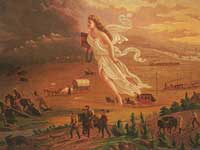Manifest Destiny
Manifest Destiny
By Robert E. May
 A term attributed to New York journalist John L. O'Sullivan, A1anifest Destiny became a slogan of U.S. expansionists in the period immediately before, during, and after the U.S.-Mexican War. O'Sullivan, cofounder and editor of both the Democratic Review and the New York Morning News, first applied the words A1anifest Destiny to the issue of U.S. annexation of Texas in the July-August 1845 issue of the Review, and then to the U.S. dispute with Great Britain over possession of Oregon in the 27 December 1845 Morning News. Although neither column was signed, O'Sullivan did write about Manifest Destiny in a signed 5 January 1846 letter on Oregon in the Morning News and is generally credited by historians with coining the phrase. Scholars note, however, that most of the concepts attached to the phrase Manifest Destiny had been espoused by O'Sullivan in only slightly different language before his 1845 and 1846 pieces; that his arguments drew on the ideology of earlier U.S. expansionists such as John Quincy Adams; and that many of his ideas can be traced back even further - to, for instance, the sense of destiny of the Puritans who settled in colonial New England and the thoughts about empire taking a westward course in the early eighteenth-century writings of the British philosopher George Berkeley.
A term attributed to New York journalist John L. O'Sullivan, A1anifest Destiny became a slogan of U.S. expansionists in the period immediately before, during, and after the U.S.-Mexican War. O'Sullivan, cofounder and editor of both the Democratic Review and the New York Morning News, first applied the words A1anifest Destiny to the issue of U.S. annexation of Texas in the July-August 1845 issue of the Review, and then to the U.S. dispute with Great Britain over possession of Oregon in the 27 December 1845 Morning News. Although neither column was signed, O'Sullivan did write about Manifest Destiny in a signed 5 January 1846 letter on Oregon in the Morning News and is generally credited by historians with coining the phrase. Scholars note, however, that most of the concepts attached to the phrase Manifest Destiny had been espoused by O'Sullivan in only slightly different language before his 1845 and 1846 pieces; that his arguments drew on the ideology of earlier U.S. expansionists such as John Quincy Adams; and that many of his ideas can be traced back even further - to, for instance, the sense of destiny of the Puritans who settled in colonial New England and the thoughts about empire taking a westward course in the early eighteenth-century writings of the British philosopher George Berkeley.
Manifest Destiny, as O'Sullivan explained it, described the United States's providential mission to extend its systems of democracy, federalism, and personal freedom, as well as to accommodate its rapidly growing population by ultimately taking possession of the entire North American continent. O'Sullivan argued that this U.S. "true title" superseded any competing claims to the continent that European states might have on the basis of prior discovery or prior settlement. Further, he emphasized that the way to continental hegemony was to be peaceful, achieved primarily through the work of "Anglo-Saxon emigration." Unlike imperial European nations that conquered their empires, the United States would wait for peoples living elsewhere to realize the advantages of annexation and voluntarily seek incorporation into the Union.
After the U.S.-Mexican War began, U.S. expansionists invoked the phrase Manifest Destiny to rationalize imperialistic demands that their country use the opportunity provided by the conflict and conquer and retain much or all of Mexico. Even O'Sullivan, who had stressed Manifest Destiny's peaceful nature, claimed that the United States deserved an indemnity such as California from Mexico. Many wartime proponents of Manifest Destiny fused into the ideology a belief that the United States had a mission to regenerate Mexico by bringing progress and Protestantism southward: U.S. troops would liberate what was described as a benighted Mexican population from the control of despotic rulers and Catholic priests. In answer to racialist arguments against absorbing Mexicans into the Union, some wartime expansionists, using a primitive form of Darwinian logic, responded that through superior breeding abilities or other means U.S. Anglo-Saxons would gradually displace Mexicans, and that there was nothing to fear from expansion southward. After the U.S.-Mexican War, U.S. expansionists broadened Manifest Destiny's scope, applying the slogan increasingly to areas beyond the continent including Cuba, Hawaii, and South America. The term remained in use throughout the late nineteenth century.






